CPPDSM4008A: Legal & Ethical Requirements of Property Sales Assessment
VerifiedAdded on 2021/05/31
|18
|4951
|185
Homework Assignment
AI Summary
This assessment explores the legal and ethical requirements of property sales, specifically focusing on the unit CPPDSM4008A. The assignment includes short-answer questions covering land titles (freehold, leasehold, Torrens, and strata), prospecting methods, methods of sale (private treaty, auction, tender) with their advantages and disadvantages, and the components of a marketing plan. It also examines the role of the land title registry and the importance of checking information against the agency authority. The assessment further includes a case study and a work project involving an open-for-inspection report and the completion of a sales agency agreement, requiring the application of legal and ethical principles in real estate practice.
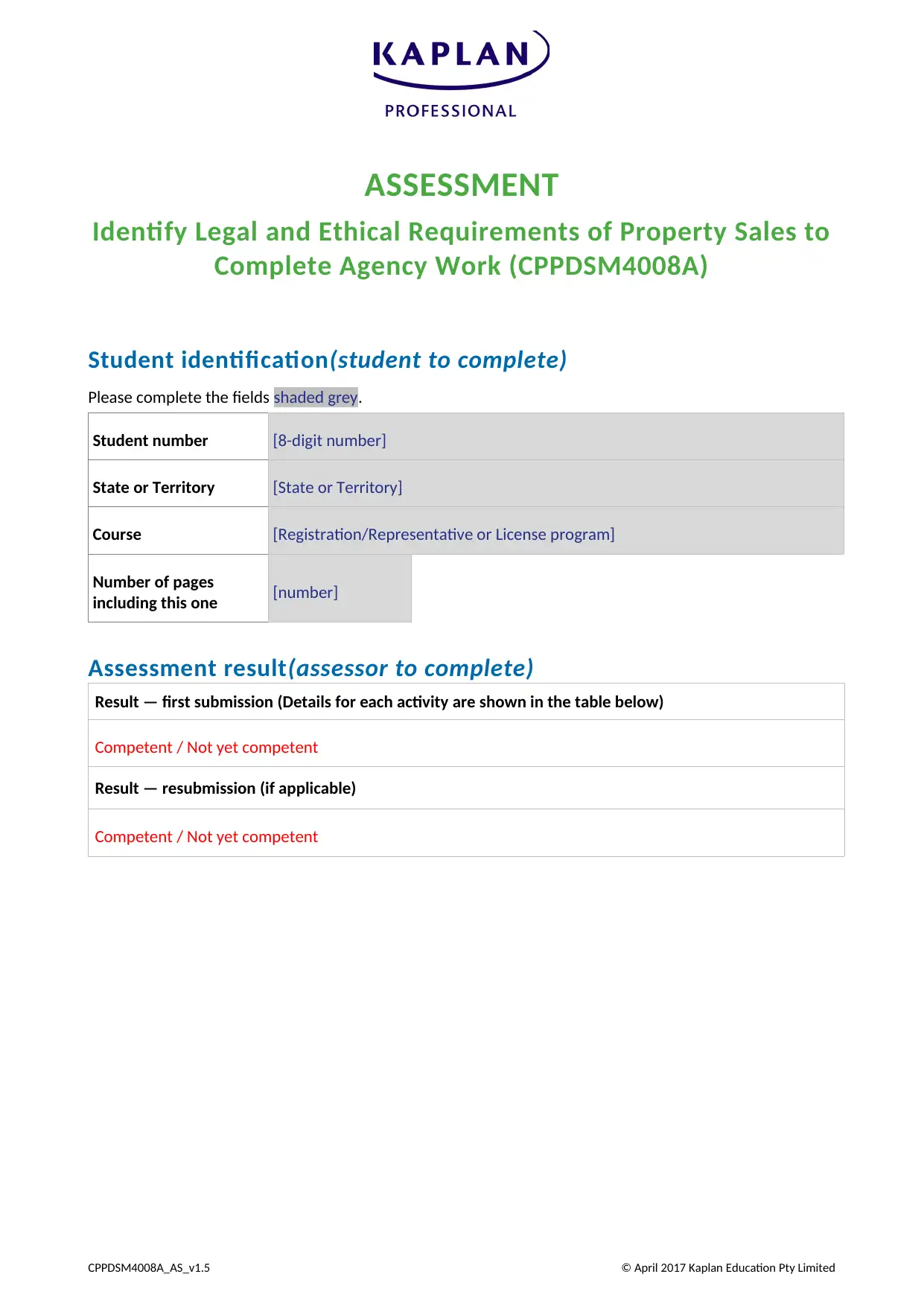
ASSESSMENT
Identify Legal and Ethical Requirements of Property Sales to
Complete Agency Work (CPPDSM4008A)
Student identification(student to complete)
Please complete the fields shaded grey.
Student number [8-digit number]
State or Territory [State or Territory]
Course [Registration/Representative or License program]
Number of pages
including this one [number]
Assessment result(assessor to complete)
Result — first submission (Details for each activity are shown in the table below)
Competent / Not yet competent
Result — resubmission (if applicable)
Competent / Not yet competent
CPPDSM4008A_AS_v1.5 © April 2017 Kaplan Education Pty Limited
Identify Legal and Ethical Requirements of Property Sales to
Complete Agency Work (CPPDSM4008A)
Student identification(student to complete)
Please complete the fields shaded grey.
Student number [8-digit number]
State or Territory [State or Territory]
Course [Registration/Representative or License program]
Number of pages
including this one [number]
Assessment result(assessor to complete)
Result — first submission (Details for each activity are shown in the table below)
Competent / Not yet competent
Result — resubmission (if applicable)
Competent / Not yet competent
CPPDSM4008A_AS_v1.5 © April 2017 Kaplan Education Pty Limited
Paraphrase This Document
Need a fresh take? Get an instant paraphrase of this document with our AI Paraphraser

Feedback (assessor to complete)
[insert assessor feedback]
CPPDSM4008A_AS_v1.5 Page 2 of 18
[insert assessor feedback]
CPPDSM4008A_AS_v1.5 Page 2 of 18
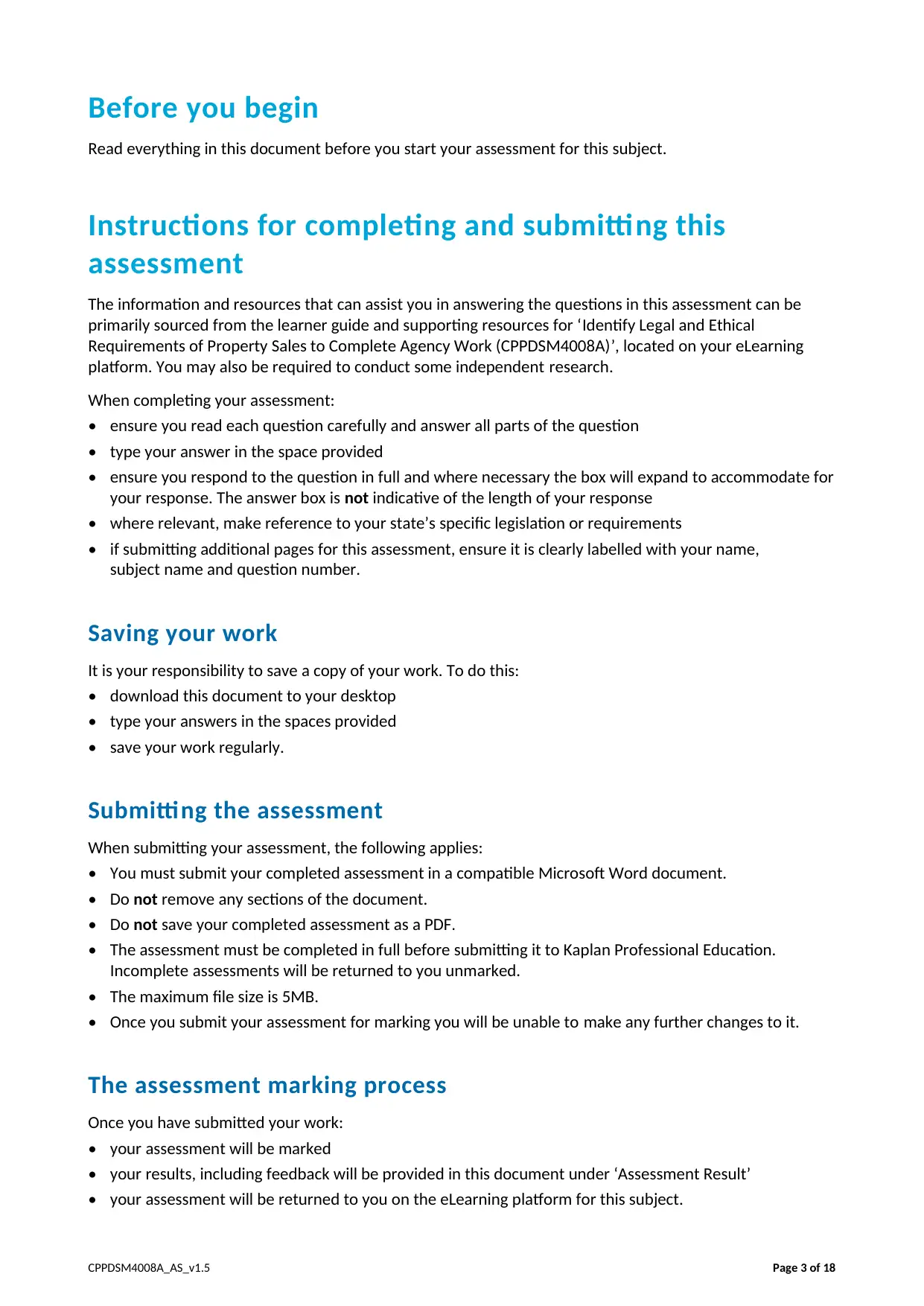
Before you begin
Read everything in this document before you start your assessment for this subject.
Instructions for completing and submitting this
assessment
The information and resources that can assist you in answering the questions in this assessment can be
primarily sourced from the learner guide and supporting resources for ‘Identify Legal and Ethical
Requirements of Property Sales to Complete Agency Work (CPPDSM4008A)’, located on your eLearning
platform. You may also be required to conduct some independent research.
When completing your assessment:
• ensure you read each question carefully and answer all parts of the question
• type your answer in the space provided
• ensure you respond to the question in full and where necessary the box will expand to accommodate for
your response. The answer box is not indicative of the length of your response
• where relevant, make reference to your state’s specific legislation or requirements
• if submitting additional pages for this assessment, ensure it is clearly labelled with your name,
subject name and question number.
Saving your work
It is your responsibility to save a copy of your work. To do this:
• download this document to your desktop
• type your answers in the spaces provided
• save your work regularly.
Submitting the assessment
When submitting your assessment, the following applies:
• You must submit your completed assessment in a compatible Microsoft Word document.
• Do not remove any sections of the document.
• Do not save your completed assessment as a PDF.
• The assessment must be completed in full before submitting it to Kaplan Professional Education.
Incomplete assessments will be returned to you unmarked.
• The maximum file size is 5MB.
• Once you submit your assessment for marking you will be unable to make any further changes to it.
The assessment marking process
Once you have submitted your work:
• your assessment will be marked
• your results, including feedback will be provided in this document under ‘Assessment Result’
• your assessment will be returned to you on the eLearning platform for this subject.
CPPDSM4008A_AS_v1.5 Page 3 of 18
Read everything in this document before you start your assessment for this subject.
Instructions for completing and submitting this
assessment
The information and resources that can assist you in answering the questions in this assessment can be
primarily sourced from the learner guide and supporting resources for ‘Identify Legal and Ethical
Requirements of Property Sales to Complete Agency Work (CPPDSM4008A)’, located on your eLearning
platform. You may also be required to conduct some independent research.
When completing your assessment:
• ensure you read each question carefully and answer all parts of the question
• type your answer in the space provided
• ensure you respond to the question in full and where necessary the box will expand to accommodate for
your response. The answer box is not indicative of the length of your response
• where relevant, make reference to your state’s specific legislation or requirements
• if submitting additional pages for this assessment, ensure it is clearly labelled with your name,
subject name and question number.
Saving your work
It is your responsibility to save a copy of your work. To do this:
• download this document to your desktop
• type your answers in the spaces provided
• save your work regularly.
Submitting the assessment
When submitting your assessment, the following applies:
• You must submit your completed assessment in a compatible Microsoft Word document.
• Do not remove any sections of the document.
• Do not save your completed assessment as a PDF.
• The assessment must be completed in full before submitting it to Kaplan Professional Education.
Incomplete assessments will be returned to you unmarked.
• The maximum file size is 5MB.
• Once you submit your assessment for marking you will be unable to make any further changes to it.
The assessment marking process
Once you have submitted your work:
• your assessment will be marked
• your results, including feedback will be provided in this document under ‘Assessment Result’
• your assessment will be returned to you on the eLearning platform for this subject.
CPPDSM4008A_AS_v1.5 Page 3 of 18
⊘ This is a preview!⊘
Do you want full access?
Subscribe today to unlock all pages.

Trusted by 1+ million students worldwide
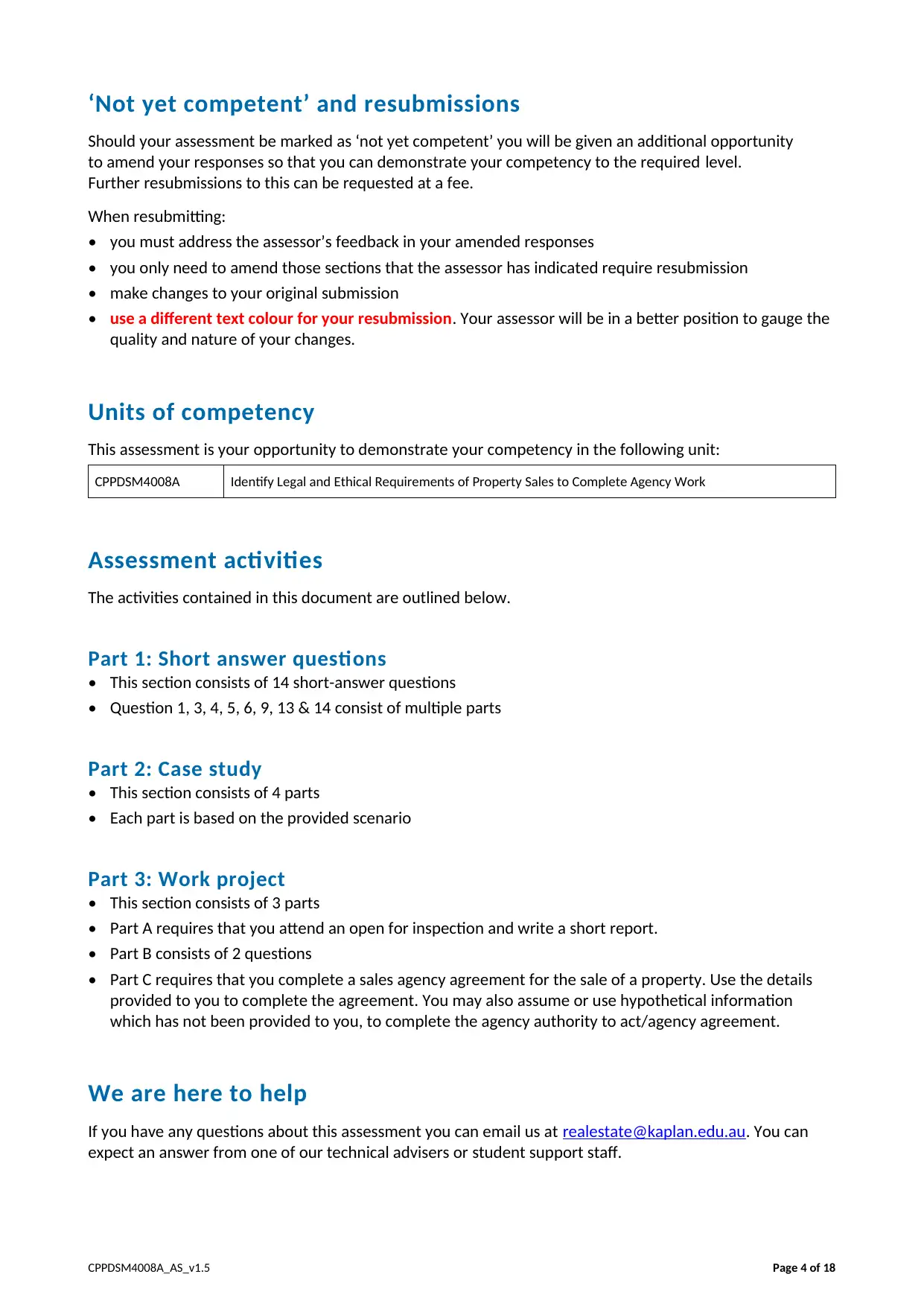
‘Not yet competent’ and resubmissions
Should your assessment be marked as ‘not yet competent’ you will be given an additional opportunity
to amend your responses so that you can demonstrate your competency to the required level.
Further resubmissions to this can be requested at a fee.
When resubmitting:
• you must address the assessor’s feedback in your amended responses
• you only need to amend those sections that the assessor has indicated require resubmission
• make changes to your original submission
• use a different text colour for your resubmission. Your assessor will be in a better position to gauge the
quality and nature of your changes.
Units of competency
This assessment is your opportunity to demonstrate your competency in the following unit:
CPPDSM4008A Identify Legal and Ethical Requirements of Property Sales to Complete Agency Work
Assessment activities
The activities contained in this document are outlined below.
Part 1: Short answer questions
• This section consists of 14 short-answer questions
• Question 1, 3, 4, 5, 6, 9, 13 & 14 consist of multiple parts
Part 2: Case study
• This section consists of 4 parts
• Each part is based on the provided scenario
Part 3: Work project
• This section consists of 3 parts
• Part A requires that you attend an open for inspection and write a short report.
• Part B consists of 2 questions
• Part C requires that you complete a sales agency agreement for the sale of a property. Use the details
provided to you to complete the agreement. You may also assume or use hypothetical information
which has not been provided to you, to complete the agency authority to act/agency agreement.
We are here to help
If you have any questions about this assessment you can email us at realestate@kaplan.edu.au. You can
expect an answer from one of our technical advisers or student support staff.
CPPDSM4008A_AS_v1.5 Page 4 of 18
Should your assessment be marked as ‘not yet competent’ you will be given an additional opportunity
to amend your responses so that you can demonstrate your competency to the required level.
Further resubmissions to this can be requested at a fee.
When resubmitting:
• you must address the assessor’s feedback in your amended responses
• you only need to amend those sections that the assessor has indicated require resubmission
• make changes to your original submission
• use a different text colour for your resubmission. Your assessor will be in a better position to gauge the
quality and nature of your changes.
Units of competency
This assessment is your opportunity to demonstrate your competency in the following unit:
CPPDSM4008A Identify Legal and Ethical Requirements of Property Sales to Complete Agency Work
Assessment activities
The activities contained in this document are outlined below.
Part 1: Short answer questions
• This section consists of 14 short-answer questions
• Question 1, 3, 4, 5, 6, 9, 13 & 14 consist of multiple parts
Part 2: Case study
• This section consists of 4 parts
• Each part is based on the provided scenario
Part 3: Work project
• This section consists of 3 parts
• Part A requires that you attend an open for inspection and write a short report.
• Part B consists of 2 questions
• Part C requires that you complete a sales agency agreement for the sale of a property. Use the details
provided to you to complete the agreement. You may also assume or use hypothetical information
which has not been provided to you, to complete the agency authority to act/agency agreement.
We are here to help
If you have any questions about this assessment you can email us at realestate@kaplan.edu.au. You can
expect an answer from one of our technical advisers or student support staff.
CPPDSM4008A_AS_v1.5 Page 4 of 18
Paraphrase This Document
Need a fresh take? Get an instant paraphrase of this document with our AI Paraphraser
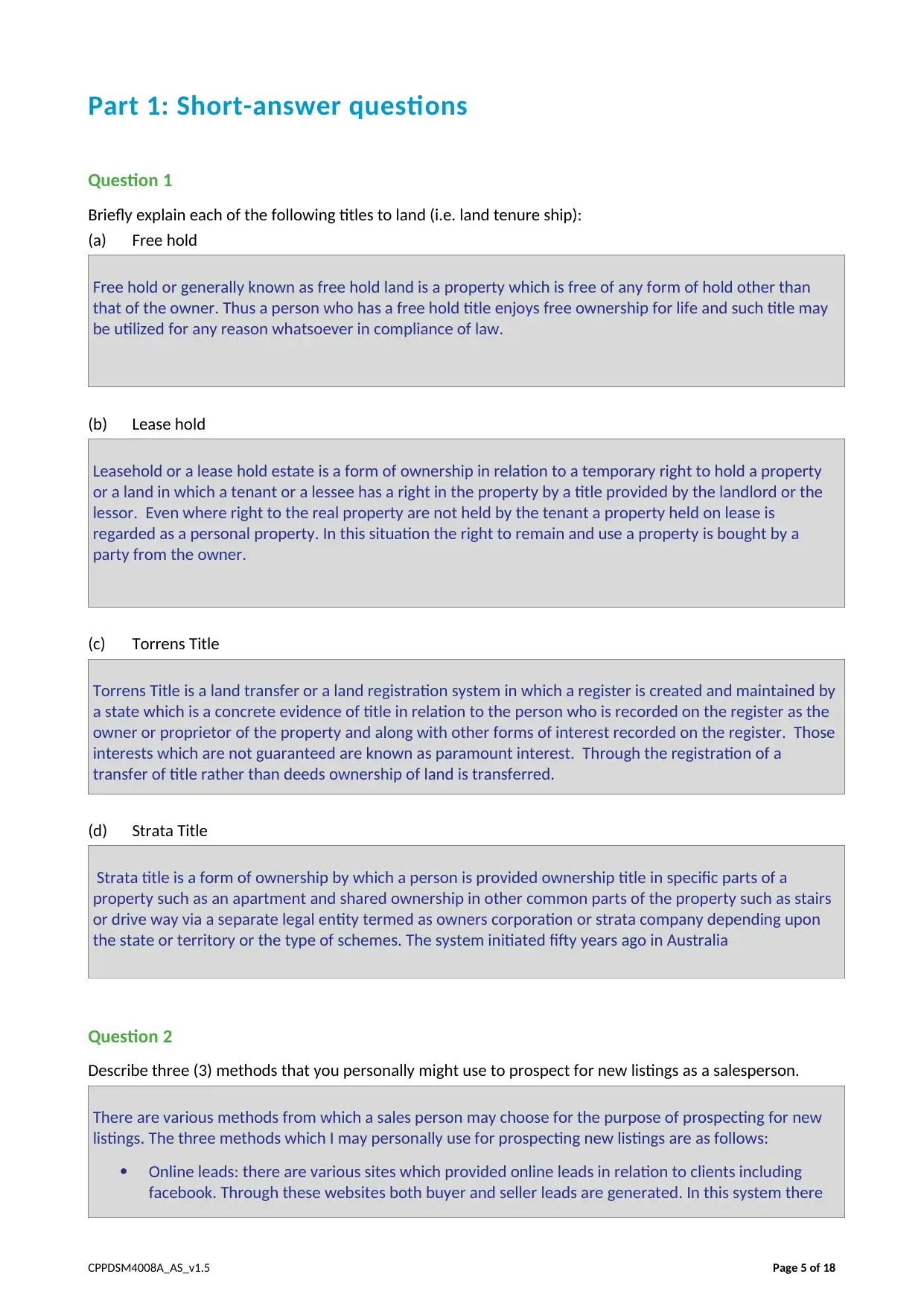
Part 1: Short-answer questions
Question 1
Briefly explain each of the following titles to land (i.e. land tenure ship):
(a) Free hold
Free hold or generally known as free hold land is a property which is free of any form of hold other than
that of the owner. Thus a person who has a free hold title enjoys free ownership for life and such title may
be utilized for any reason whatsoever in compliance of law.
(b) Lease hold
Leasehold or a lease hold estate is a form of ownership in relation to a temporary right to hold a property
or a land in which a tenant or a lessee has a right in the property by a title provided by the landlord or the
lessor. Even where right to the real property are not held by the tenant a property held on lease is
regarded as a personal property. In this situation the right to remain and use a property is bought by a
party from the owner.
(c) Torrens Title
Torrens Title is a land transfer or a land registration system in which a register is created and maintained by
a state which is a concrete evidence of title in relation to the person who is recorded on the register as the
owner or proprietor of the property and along with other forms of interest recorded on the register. Those
interests which are not guaranteed are known as paramount interest. Through the registration of a
transfer of title rather than deeds ownership of land is transferred.
(d) Strata Title
Strata title is a form of ownership by which a person is provided ownership title in specific parts of a
property such as an apartment and shared ownership in other common parts of the property such as stairs
or drive way via a separate legal entity termed as owners corporation or strata company depending upon
the state or territory or the type of schemes. The system initiated fifty years ago in Australia
Question 2
Describe three (3) methods that you personally might use to prospect for new listings as a salesperson.
There are various methods from which a sales person may choose for the purpose of prospecting for new
listings. The three methods which I may personally use for prospecting new listings are as follows:
Online leads: there are various sites which provided online leads in relation to clients including
facebook. Through these websites both buyer and seller leads are generated. In this system there
CPPDSM4008A_AS_v1.5 Page 5 of 18
Question 1
Briefly explain each of the following titles to land (i.e. land tenure ship):
(a) Free hold
Free hold or generally known as free hold land is a property which is free of any form of hold other than
that of the owner. Thus a person who has a free hold title enjoys free ownership for life and such title may
be utilized for any reason whatsoever in compliance of law.
(b) Lease hold
Leasehold or a lease hold estate is a form of ownership in relation to a temporary right to hold a property
or a land in which a tenant or a lessee has a right in the property by a title provided by the landlord or the
lessor. Even where right to the real property are not held by the tenant a property held on lease is
regarded as a personal property. In this situation the right to remain and use a property is bought by a
party from the owner.
(c) Torrens Title
Torrens Title is a land transfer or a land registration system in which a register is created and maintained by
a state which is a concrete evidence of title in relation to the person who is recorded on the register as the
owner or proprietor of the property and along with other forms of interest recorded on the register. Those
interests which are not guaranteed are known as paramount interest. Through the registration of a
transfer of title rather than deeds ownership of land is transferred.
(d) Strata Title
Strata title is a form of ownership by which a person is provided ownership title in specific parts of a
property such as an apartment and shared ownership in other common parts of the property such as stairs
or drive way via a separate legal entity termed as owners corporation or strata company depending upon
the state or territory or the type of schemes. The system initiated fifty years ago in Australia
Question 2
Describe three (3) methods that you personally might use to prospect for new listings as a salesperson.
There are various methods from which a sales person may choose for the purpose of prospecting for new
listings. The three methods which I may personally use for prospecting new listings are as follows:
Online leads: there are various sites which provided online leads in relation to clients including
facebook. Through these websites both buyer and seller leads are generated. In this system there
CPPDSM4008A_AS_v1.5 Page 5 of 18
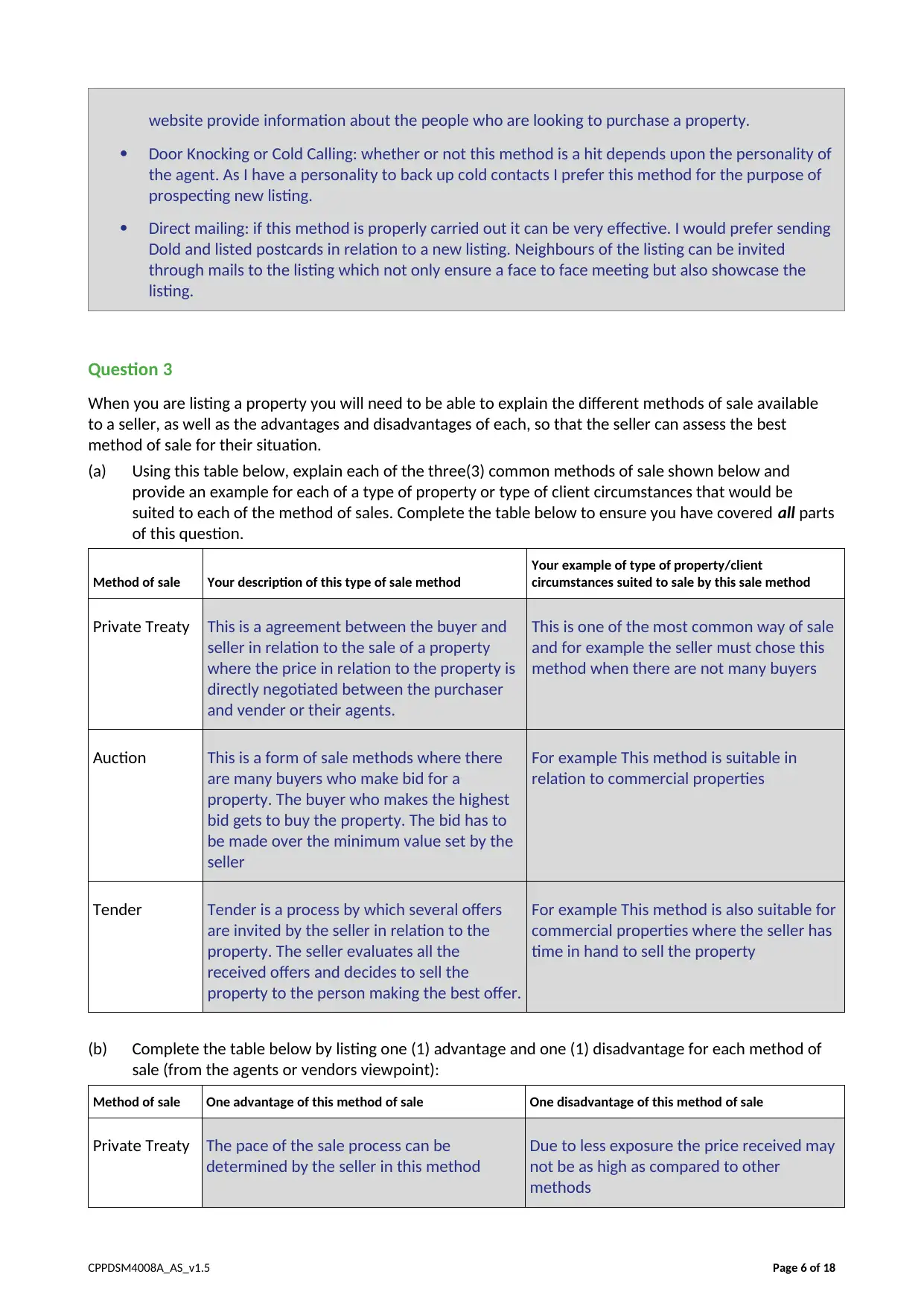
website provide information about the people who are looking to purchase a property.
Door Knocking or Cold Calling: whether or not this method is a hit depends upon the personality of
the agent. As I have a personality to back up cold contacts I prefer this method for the purpose of
prospecting new listing.
Direct mailing: if this method is properly carried out it can be very effective. I would prefer sending
Dold and listed postcards in relation to a new listing. Neighbours of the listing can be invited
through mails to the listing which not only ensure a face to face meeting but also showcase the
listing.
Question 3
When you are listing a property you will need to be able to explain the different methods of sale available
to a seller, as well as the advantages and disadvantages of each, so that the seller can assess the best
method of sale for their situation.
(a) Using this table below, explain each of the three(3) common methods of sale shown below and
provide an example for each of a type of property or type of client circumstances that would be
suited to each of the method of sales. Complete the table below to ensure you have covered all parts
of this question.
Method of sale Your description of this type of sale method
Your example of type of property/client
circumstances suited to sale by this sale method
Private Treaty This is a agreement between the buyer and
seller in relation to the sale of a property
where the price in relation to the property is
directly negotiated between the purchaser
and vender or their agents.
This is one of the most common way of sale
and for example the seller must chose this
method when there are not many buyers
Auction This is a form of sale methods where there
are many buyers who make bid for a
property. The buyer who makes the highest
bid gets to buy the property. The bid has to
be made over the minimum value set by the
seller
For example This method is suitable in
relation to commercial properties
Tender Tender is a process by which several offers
are invited by the seller in relation to the
property. The seller evaluates all the
received offers and decides to sell the
property to the person making the best offer.
For example This method is also suitable for
commercial properties where the seller has
time in hand to sell the property
(b) Complete the table below by listing one (1) advantage and one (1) disadvantage for each method of
sale (from the agents or vendors viewpoint):
Method of sale One advantage of this method of sale One disadvantage of this method of sale
Private Treaty The pace of the sale process can be
determined by the seller in this method
Due to less exposure the price received may
not be as high as compared to other
methods
CPPDSM4008A_AS_v1.5 Page 6 of 18
Door Knocking or Cold Calling: whether or not this method is a hit depends upon the personality of
the agent. As I have a personality to back up cold contacts I prefer this method for the purpose of
prospecting new listing.
Direct mailing: if this method is properly carried out it can be very effective. I would prefer sending
Dold and listed postcards in relation to a new listing. Neighbours of the listing can be invited
through mails to the listing which not only ensure a face to face meeting but also showcase the
listing.
Question 3
When you are listing a property you will need to be able to explain the different methods of sale available
to a seller, as well as the advantages and disadvantages of each, so that the seller can assess the best
method of sale for their situation.
(a) Using this table below, explain each of the three(3) common methods of sale shown below and
provide an example for each of a type of property or type of client circumstances that would be
suited to each of the method of sales. Complete the table below to ensure you have covered all parts
of this question.
Method of sale Your description of this type of sale method
Your example of type of property/client
circumstances suited to sale by this sale method
Private Treaty This is a agreement between the buyer and
seller in relation to the sale of a property
where the price in relation to the property is
directly negotiated between the purchaser
and vender or their agents.
This is one of the most common way of sale
and for example the seller must chose this
method when there are not many buyers
Auction This is a form of sale methods where there
are many buyers who make bid for a
property. The buyer who makes the highest
bid gets to buy the property. The bid has to
be made over the minimum value set by the
seller
For example This method is suitable in
relation to commercial properties
Tender Tender is a process by which several offers
are invited by the seller in relation to the
property. The seller evaluates all the
received offers and decides to sell the
property to the person making the best offer.
For example This method is also suitable for
commercial properties where the seller has
time in hand to sell the property
(b) Complete the table below by listing one (1) advantage and one (1) disadvantage for each method of
sale (from the agents or vendors viewpoint):
Method of sale One advantage of this method of sale One disadvantage of this method of sale
Private Treaty The pace of the sale process can be
determined by the seller in this method
Due to less exposure the price received may
not be as high as compared to other
methods
CPPDSM4008A_AS_v1.5 Page 6 of 18
⊘ This is a preview!⊘
Do you want full access?
Subscribe today to unlock all pages.

Trusted by 1+ million students worldwide

Method of sale One advantage of this method of sale One disadvantage of this method of sale
Auction Best price can be achieved in relation to a
property which is sold by an auction and it
can be more than the expectation of the
seller
Fee needs to be paid to the solicitor and the
person auctioning the property. Expenditure
also needs to be incurred for setting up an
auction
Tender The price of a property is kept secret and
thus there will be no rumours or complaints
about high or over price.
The process is time consuming as the bind
received by the tender may be
unsatisfactory
CPPDSM4008A_AS_v1.5 Page 7 of 18
Auction Best price can be achieved in relation to a
property which is sold by an auction and it
can be more than the expectation of the
seller
Fee needs to be paid to the solicitor and the
person auctioning the property. Expenditure
also needs to be incurred for setting up an
auction
Tender The price of a property is kept secret and
thus there will be no rumours or complaints
about high or over price.
The process is time consuming as the bind
received by the tender may be
unsatisfactory
CPPDSM4008A_AS_v1.5 Page 7 of 18
Paraphrase This Document
Need a fresh take? Get an instant paraphrase of this document with our AI Paraphraser
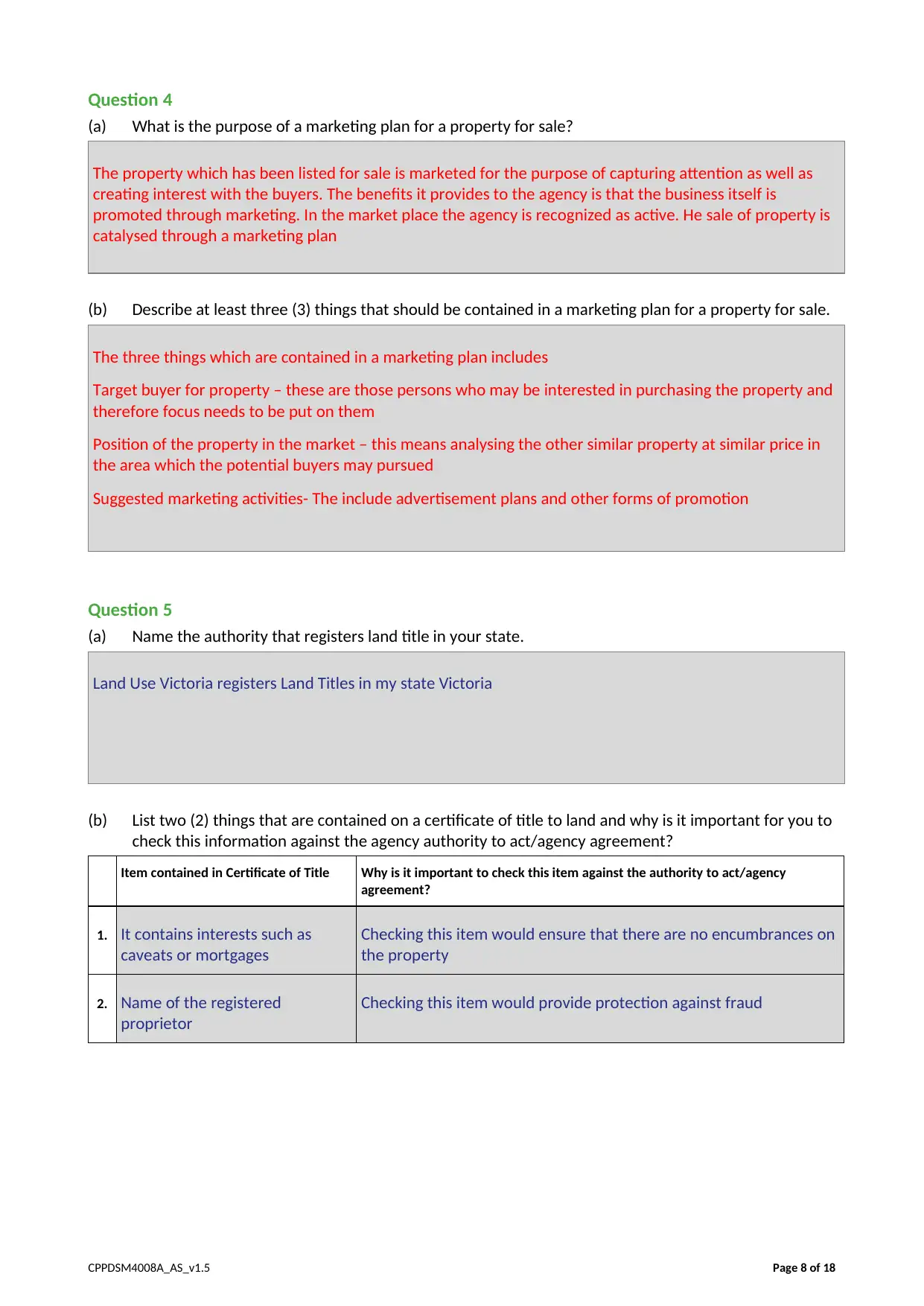
Question 4
(a) What is the purpose of a marketing plan for a property for sale?
The property which has been listed for sale is marketed for the purpose of capturing attention as well as
creating interest with the buyers. The benefits it provides to the agency is that the business itself is
promoted through marketing. In the market place the agency is recognized as active. He sale of property is
catalysed through a marketing plan
(b) Describe at least three (3) things that should be contained in a marketing plan for a property for sale.
The three things which are contained in a marketing plan includes
Target buyer for property – these are those persons who may be interested in purchasing the property and
therefore focus needs to be put on them
Position of the property in the market – this means analysing the other similar property at similar price in
the area which the potential buyers may pursued
Suggested marketing activities- The include advertisement plans and other forms of promotion
Question 5
(a) Name the authority that registers land title in your state.
Land Use Victoria registers Land Titles in my state Victoria
(b) List two (2) things that are contained on a certificate of title to land and why is it important for you to
check this information against the agency authority to act/agency agreement?
Item contained in Certificate of Title Why is it important to check this item against the authority to act/agency
agreement?
1. It contains interests such as
caveats or mortgages
Checking this item would ensure that there are no encumbrances on
the property
2. Name of the registered
proprietor
Checking this item would provide protection against fraud
CPPDSM4008A_AS_v1.5 Page 8 of 18
(a) What is the purpose of a marketing plan for a property for sale?
The property which has been listed for sale is marketed for the purpose of capturing attention as well as
creating interest with the buyers. The benefits it provides to the agency is that the business itself is
promoted through marketing. In the market place the agency is recognized as active. He sale of property is
catalysed through a marketing plan
(b) Describe at least three (3) things that should be contained in a marketing plan for a property for sale.
The three things which are contained in a marketing plan includes
Target buyer for property – these are those persons who may be interested in purchasing the property and
therefore focus needs to be put on them
Position of the property in the market – this means analysing the other similar property at similar price in
the area which the potential buyers may pursued
Suggested marketing activities- The include advertisement plans and other forms of promotion
Question 5
(a) Name the authority that registers land title in your state.
Land Use Victoria registers Land Titles in my state Victoria
(b) List two (2) things that are contained on a certificate of title to land and why is it important for you to
check this information against the agency authority to act/agency agreement?
Item contained in Certificate of Title Why is it important to check this item against the authority to act/agency
agreement?
1. It contains interests such as
caveats or mortgages
Checking this item would ensure that there are no encumbrances on
the property
2. Name of the registered
proprietor
Checking this item would provide protection against fraud
CPPDSM4008A_AS_v1.5 Page 8 of 18
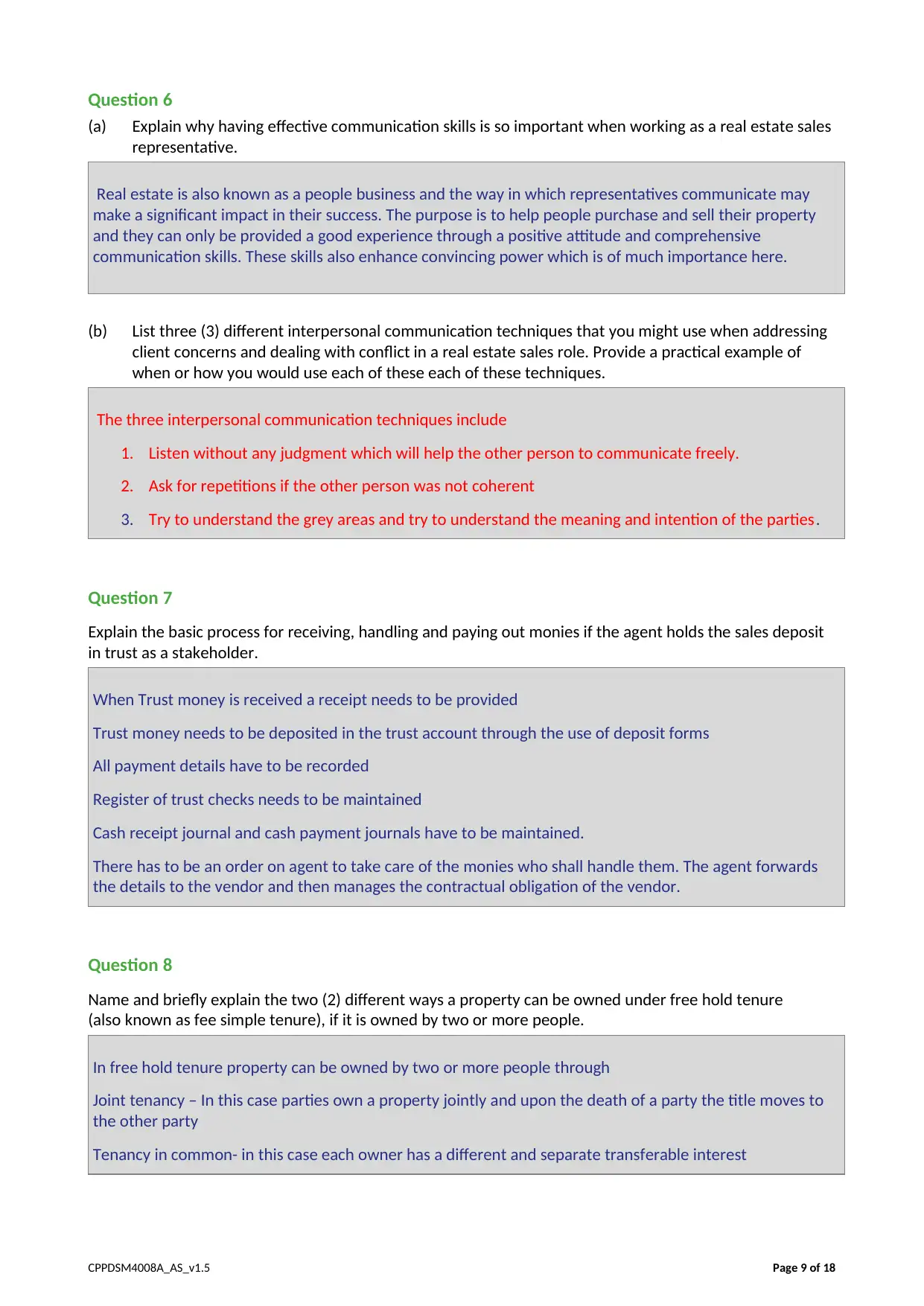
Question 6
(a) Explain why having effective communication skills is so important when working as a real estate sales
representative.
Real estate is also known as a people business and the way in which representatives communicate may
make a significant impact in their success. The purpose is to help people purchase and sell their property
and they can only be provided a good experience through a positive attitude and comprehensive
communication skills. These skills also enhance convincing power which is of much importance here.
(b) List three (3) different interpersonal communication techniques that you might use when addressing
client concerns and dealing with conflict in a real estate sales role. Provide a practical example of
when or how you would use each of these each of these techniques.
The three interpersonal communication techniques include
1. Listen without any judgment which will help the other person to communicate freely.
2. Ask for repetitions if the other person was not coherent
3. Try to understand the grey areas and try to understand the meaning and intention of the parties.
Question 7
Explain the basic process for receiving, handling and paying out monies if the agent holds the sales deposit
in trust as a stakeholder.
When Trust money is received a receipt needs to be provided
Trust money needs to be deposited in the trust account through the use of deposit forms
All payment details have to be recorded
Register of trust checks needs to be maintained
Cash receipt journal and cash payment journals have to be maintained.
There has to be an order on agent to take care of the monies who shall handle them. The agent forwards
the details to the vendor and then manages the contractual obligation of the vendor.
Question 8
Name and briefly explain the two (2) different ways a property can be owned under free hold tenure
(also known as fee simple tenure), if it is owned by two or more people.
In free hold tenure property can be owned by two or more people through
Joint tenancy – In this case parties own a property jointly and upon the death of a party the title moves to
the other party
Tenancy in common- in this case each owner has a different and separate transferable interest
CPPDSM4008A_AS_v1.5 Page 9 of 18
(a) Explain why having effective communication skills is so important when working as a real estate sales
representative.
Real estate is also known as a people business and the way in which representatives communicate may
make a significant impact in their success. The purpose is to help people purchase and sell their property
and they can only be provided a good experience through a positive attitude and comprehensive
communication skills. These skills also enhance convincing power which is of much importance here.
(b) List three (3) different interpersonal communication techniques that you might use when addressing
client concerns and dealing with conflict in a real estate sales role. Provide a practical example of
when or how you would use each of these each of these techniques.
The three interpersonal communication techniques include
1. Listen without any judgment which will help the other person to communicate freely.
2. Ask for repetitions if the other person was not coherent
3. Try to understand the grey areas and try to understand the meaning and intention of the parties.
Question 7
Explain the basic process for receiving, handling and paying out monies if the agent holds the sales deposit
in trust as a stakeholder.
When Trust money is received a receipt needs to be provided
Trust money needs to be deposited in the trust account through the use of deposit forms
All payment details have to be recorded
Register of trust checks needs to be maintained
Cash receipt journal and cash payment journals have to be maintained.
There has to be an order on agent to take care of the monies who shall handle them. The agent forwards
the details to the vendor and then manages the contractual obligation of the vendor.
Question 8
Name and briefly explain the two (2) different ways a property can be owned under free hold tenure
(also known as fee simple tenure), if it is owned by two or more people.
In free hold tenure property can be owned by two or more people through
Joint tenancy – In this case parties own a property jointly and upon the death of a party the title moves to
the other party
Tenancy in common- in this case each owner has a different and separate transferable interest
CPPDSM4008A_AS_v1.5 Page 9 of 18
⊘ This is a preview!⊘
Do you want full access?
Subscribe today to unlock all pages.

Trusted by 1+ million students worldwide
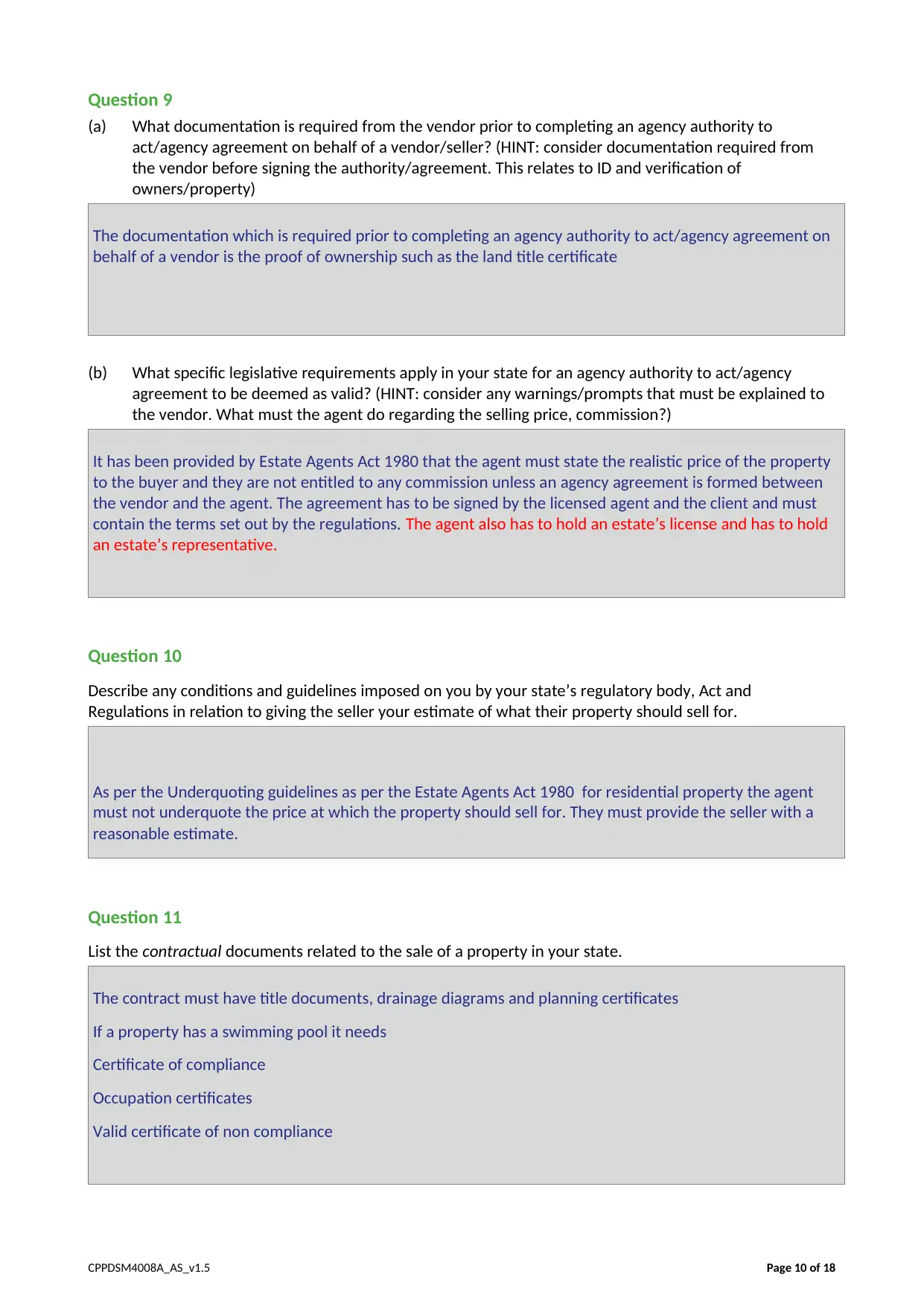
Question 9
(a) What documentation is required from the vendor prior to completing an agency authority to
act/agency agreement on behalf of a vendor/seller? (HINT: consider documentation required from
the vendor before signing the authority/agreement. This relates to ID and verification of
owners/property)
The documentation which is required prior to completing an agency authority to act/agency agreement on
behalf of a vendor is the proof of ownership such as the land title certificate
(b) What specific legislative requirements apply in your state for an agency authority to act/agency
agreement to be deemed as valid? (HINT: consider any warnings/prompts that must be explained to
the vendor. What must the agent do regarding the selling price, commission?)
It has been provided by Estate Agents Act 1980 that the agent must state the realistic price of the property
to the buyer and they are not entitled to any commission unless an agency agreement is formed between
the vendor and the agent. The agreement has to be signed by the licensed agent and the client and must
contain the terms set out by the regulations. The agent also has to hold an estate’s license and has to hold
an estate’s representative.
Question 10
Describe any conditions and guidelines imposed on you by your state’s regulatory body, Act and
Regulations in relation to giving the seller your estimate of what their property should sell for.
As per the Underquoting guidelines as per the Estate Agents Act 1980 for residential property the agent
must not underquote the price at which the property should sell for. They must provide the seller with a
reasonable estimate.
Question 11
List the contractual documents related to the sale of a property in your state.
The contract must have title documents, drainage diagrams and planning certificates
If a property has a swimming pool it needs
Certificate of compliance
Occupation certificates
Valid certificate of non compliance
CPPDSM4008A_AS_v1.5 Page 10 of 18
(a) What documentation is required from the vendor prior to completing an agency authority to
act/agency agreement on behalf of a vendor/seller? (HINT: consider documentation required from
the vendor before signing the authority/agreement. This relates to ID and verification of
owners/property)
The documentation which is required prior to completing an agency authority to act/agency agreement on
behalf of a vendor is the proof of ownership such as the land title certificate
(b) What specific legislative requirements apply in your state for an agency authority to act/agency
agreement to be deemed as valid? (HINT: consider any warnings/prompts that must be explained to
the vendor. What must the agent do regarding the selling price, commission?)
It has been provided by Estate Agents Act 1980 that the agent must state the realistic price of the property
to the buyer and they are not entitled to any commission unless an agency agreement is formed between
the vendor and the agent. The agreement has to be signed by the licensed agent and the client and must
contain the terms set out by the regulations. The agent also has to hold an estate’s license and has to hold
an estate’s representative.
Question 10
Describe any conditions and guidelines imposed on you by your state’s regulatory body, Act and
Regulations in relation to giving the seller your estimate of what their property should sell for.
As per the Underquoting guidelines as per the Estate Agents Act 1980 for residential property the agent
must not underquote the price at which the property should sell for. They must provide the seller with a
reasonable estimate.
Question 11
List the contractual documents related to the sale of a property in your state.
The contract must have title documents, drainage diagrams and planning certificates
If a property has a swimming pool it needs
Certificate of compliance
Occupation certificates
Valid certificate of non compliance
CPPDSM4008A_AS_v1.5 Page 10 of 18
Paraphrase This Document
Need a fresh take? Get an instant paraphrase of this document with our AI Paraphraser
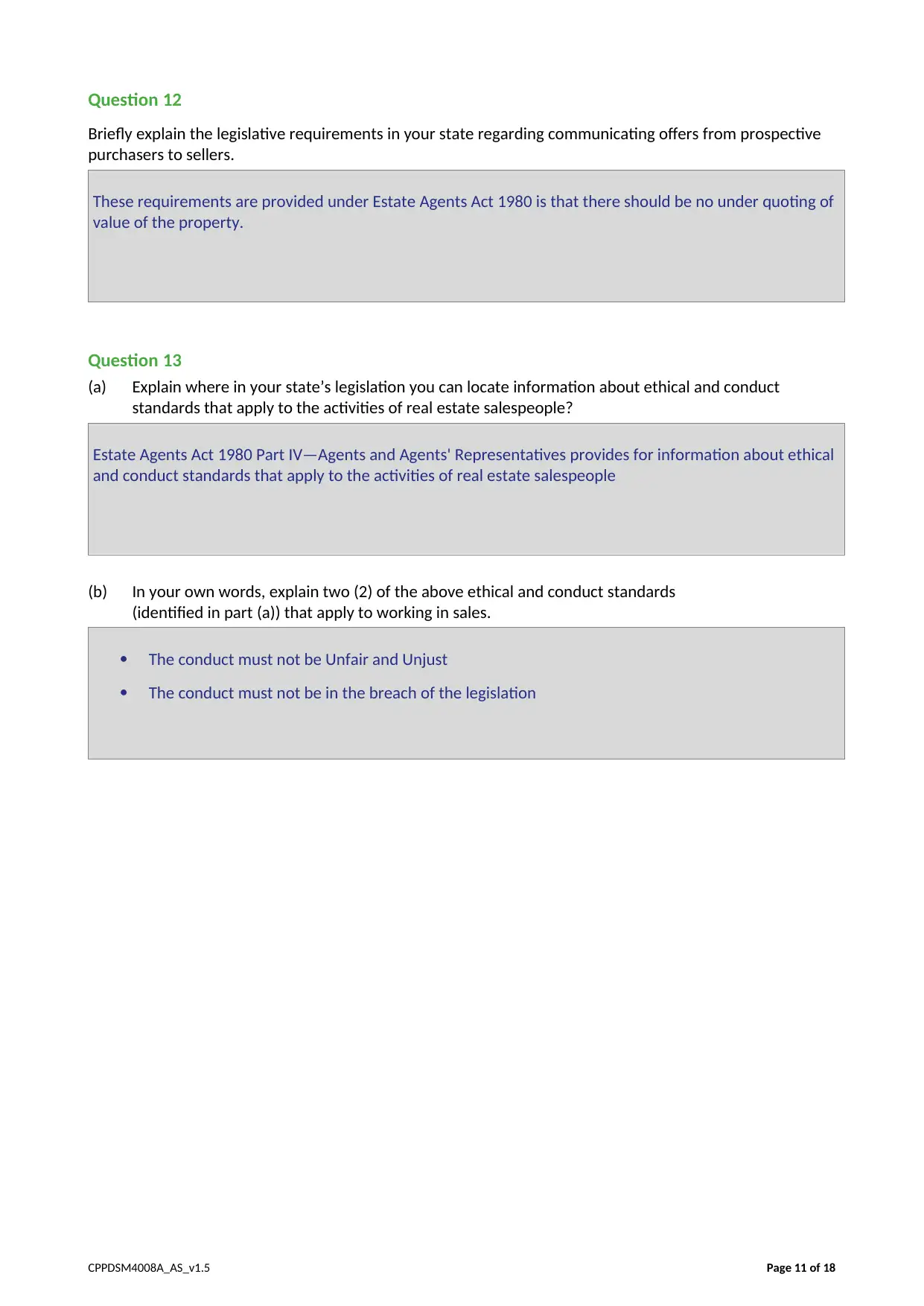
Question 12
Briefly explain the legislative requirements in your state regarding communicating offers from prospective
purchasers to sellers.
These requirements are provided under Estate Agents Act 1980 is that there should be no under quoting of
value of the property.
Question 13
(a) Explain where in your state’s legislation you can locate information about ethical and conduct
standards that apply to the activities of real estate salespeople?
Estate Agents Act 1980 Part IV—Agents and Agents' Representatives provides for information about ethical
and conduct standards that apply to the activities of real estate salespeople
(b) In your own words, explain two (2) of the above ethical and conduct standards
(identified in part (a)) that apply to working in sales.
The conduct must not be Unfair and Unjust
The conduct must not be in the breach of the legislation
CPPDSM4008A_AS_v1.5 Page 11 of 18
Briefly explain the legislative requirements in your state regarding communicating offers from prospective
purchasers to sellers.
These requirements are provided under Estate Agents Act 1980 is that there should be no under quoting of
value of the property.
Question 13
(a) Explain where in your state’s legislation you can locate information about ethical and conduct
standards that apply to the activities of real estate salespeople?
Estate Agents Act 1980 Part IV—Agents and Agents' Representatives provides for information about ethical
and conduct standards that apply to the activities of real estate salespeople
(b) In your own words, explain two (2) of the above ethical and conduct standards
(identified in part (a)) that apply to working in sales.
The conduct must not be Unfair and Unjust
The conduct must not be in the breach of the legislation
CPPDSM4008A_AS_v1.5 Page 11 of 18
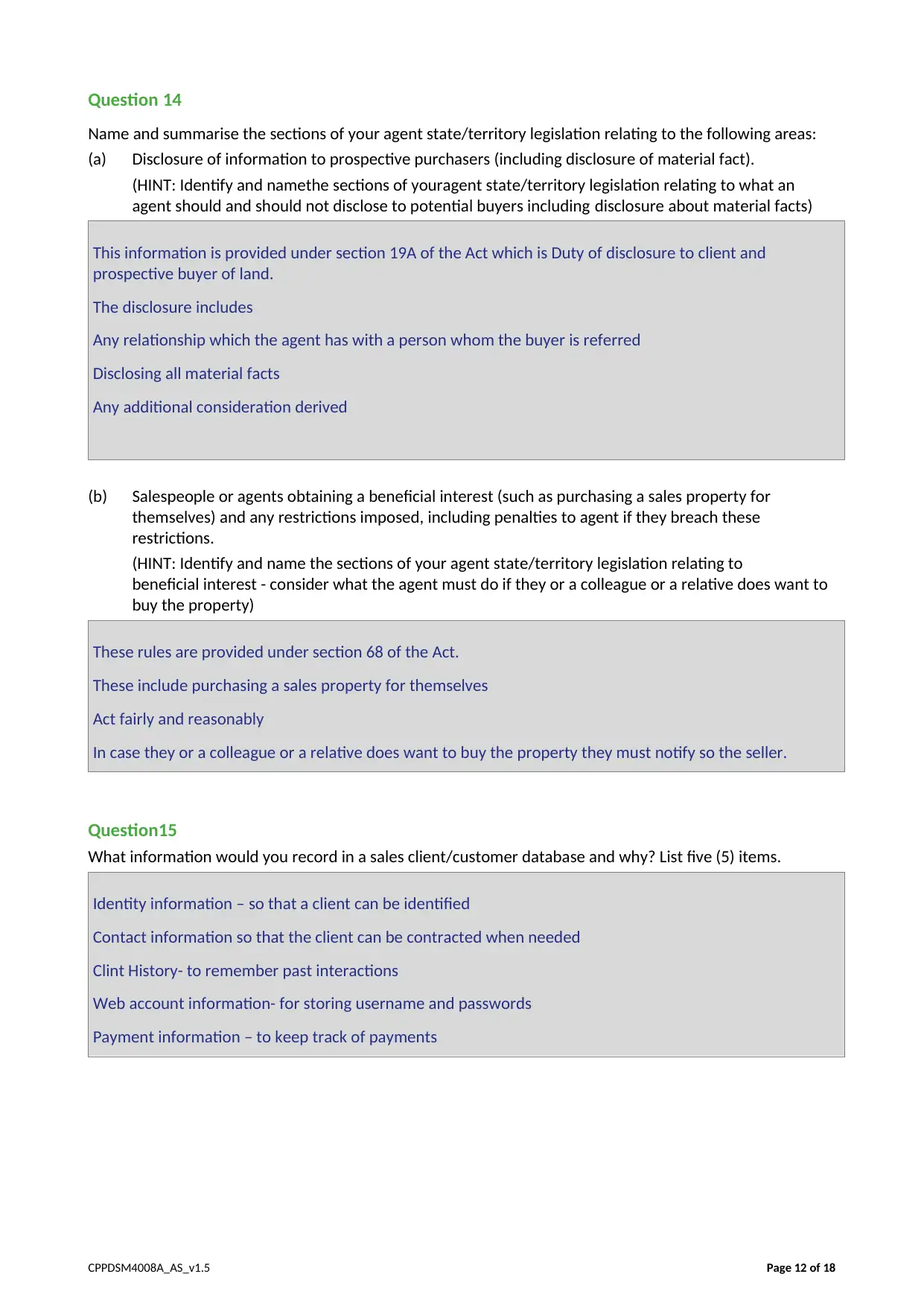
Question 14
Name and summarise the sections of your agent state/territory legislation relating to the following areas:
(a) Disclosure of information to prospective purchasers (including disclosure of material fact).
(HINT: Identify and namethe sections of youragent state/territory legislation relating to what an
agent should and should not disclose to potential buyers including disclosure about material facts)
This information is provided under section 19A of the Act which is Duty of disclosure to client and
prospective buyer of land.
The disclosure includes
Any relationship which the agent has with a person whom the buyer is referred
Disclosing all material facts
Any additional consideration derived
(b) Salespeople or agents obtaining a beneficial interest (such as purchasing a sales property for
themselves) and any restrictions imposed, including penalties to agent if they breach these
restrictions.
(HINT: Identify and name the sections of your agent state/territory legislation relating to
beneficial interest - consider what the agent must do if they or a colleague or a relative does want to
buy the property)
These rules are provided under section 68 of the Act.
These include purchasing a sales property for themselves
Act fairly and reasonably
In case they or a colleague or a relative does want to buy the property they must notify so the seller.
Question15
What information would you record in a sales client/customer database and why? List five (5) items.
Identity information – so that a client can be identified
Contact information so that the client can be contracted when needed
Clint History- to remember past interactions
Web account information- for storing username and passwords
Payment information – to keep track of payments
CPPDSM4008A_AS_v1.5 Page 12 of 18
Name and summarise the sections of your agent state/territory legislation relating to the following areas:
(a) Disclosure of information to prospective purchasers (including disclosure of material fact).
(HINT: Identify and namethe sections of youragent state/territory legislation relating to what an
agent should and should not disclose to potential buyers including disclosure about material facts)
This information is provided under section 19A of the Act which is Duty of disclosure to client and
prospective buyer of land.
The disclosure includes
Any relationship which the agent has with a person whom the buyer is referred
Disclosing all material facts
Any additional consideration derived
(b) Salespeople or agents obtaining a beneficial interest (such as purchasing a sales property for
themselves) and any restrictions imposed, including penalties to agent if they breach these
restrictions.
(HINT: Identify and name the sections of your agent state/territory legislation relating to
beneficial interest - consider what the agent must do if they or a colleague or a relative does want to
buy the property)
These rules are provided under section 68 of the Act.
These include purchasing a sales property for themselves
Act fairly and reasonably
In case they or a colleague or a relative does want to buy the property they must notify so the seller.
Question15
What information would you record in a sales client/customer database and why? List five (5) items.
Identity information – so that a client can be identified
Contact information so that the client can be contracted when needed
Clint History- to remember past interactions
Web account information- for storing username and passwords
Payment information – to keep track of payments
CPPDSM4008A_AS_v1.5 Page 12 of 18
⊘ This is a preview!⊘
Do you want full access?
Subscribe today to unlock all pages.

Trusted by 1+ million students worldwide
1 out of 18
Related Documents
Your All-in-One AI-Powered Toolkit for Academic Success.
+13062052269
info@desklib.com
Available 24*7 on WhatsApp / Email
![[object Object]](/_next/static/media/star-bottom.7253800d.svg)
Unlock your academic potential
Copyright © 2020–2026 A2Z Services. All Rights Reserved. Developed and managed by ZUCOL.





